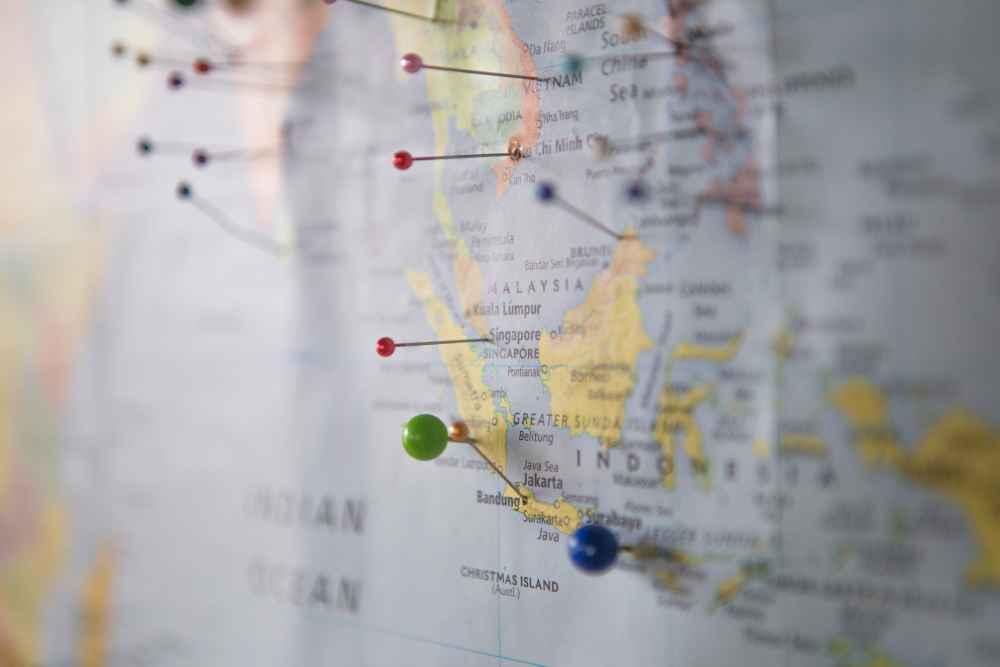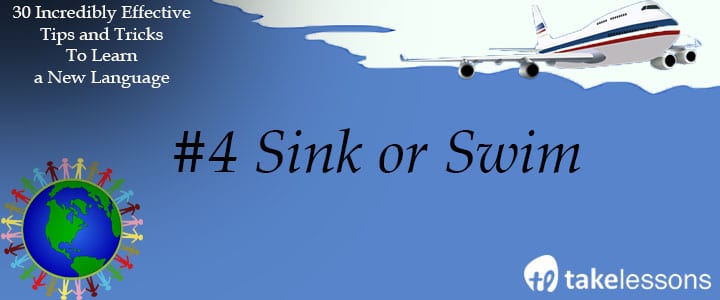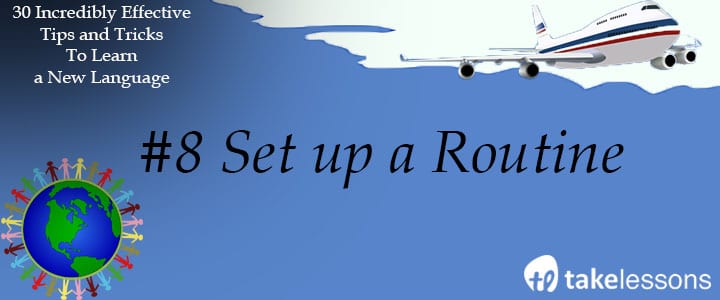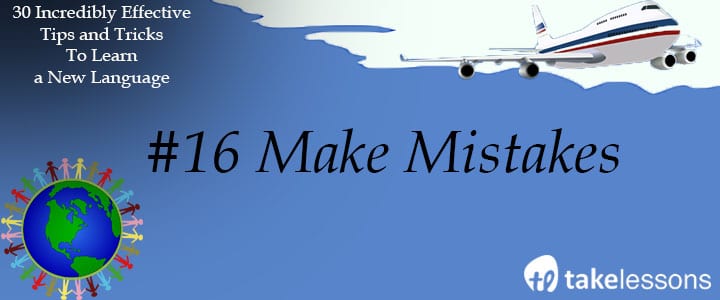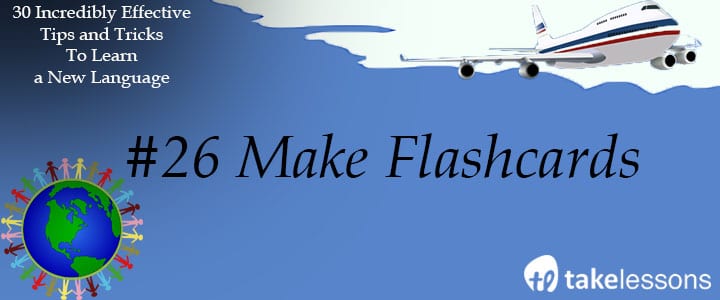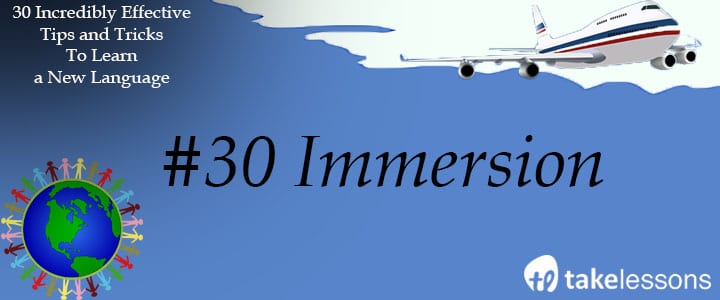
More often than not, the main question on a new language learner’s mind is, “What is the best way to learn a language?”
Between language lessons, grammar books, conversation practice, and exercises, learning a new language can be a long and challenging process. On the other hand, few things are more rewarding than carrying out a conversation in a foreign tongue.
To help you in your language-learning journey, we sought out the advice of language experts around the globe to compile the ultimate list of language-learning hacks.
If you’re looking for the fastest way to learn a new language, here are 30 incredibly effective tips and tricks to help you along the way!
1. Choose a Word of the Day
Each morning, pick a new word or two to integrate into your daily life. This is much less overwhelming than trying to memorize several different words all at once.
Incorporating new vocabulary into your day-to-day routine will help you commit these words to memory and learn to use them in real-life situations.
For more on this, check out 6 Ways to Simplify Your Foreign Language Learning by Lifehack expert Allison Lounes.
2. Connect With Friends and Language Partners
Textbooks and grammar workbooks are only one small element of learning a new language. You’re not actually fluent and/or functional until you can use your new language in conversation.
The best way to do this is to practice with native speakers.
Not sure where to find people who speak your language of choice? Search for language partners online, or explore language events and Meetup groups in your area.
For more on this tip, check out the Zen Habits post How to Learn A New Language in 90 Days (guest post by Maneesh Sethi of Hack the System)
3. Always Carry a Notebook
This tip is especially important if you plan to travel abroad, but it’s a great idea even if you’re staying local for your studies.
Keep a notebook handy and write down anything you don’t understand while you’re studying – watching TV in your foreign language, doing exercises on an app, or listening to foreign music.
Plus, as Go Overseas blogger Jenny Marshall points out, “something as simple as a Moleskin pocket notebook fits easily almost anywhere, and looks downright important when you pull it out to take notes.”
For more, see 5 Easy Hacks for Learning a New Language Abroad
4. Sink or Swim/All or Nothing
This doesn’t mean you need to put your life in danger, it simply means it’s time to raise the stakes!
Put yourself in a situation where you have to learn your new language, or face failure. It may sound extreme, but it’s one of the best ways to learn a new language.
Travel to Germany, and don’t allow yourself to speak English. Sign up for a language immersion program and jump in without looking back.
Whatever you can do to increase your sense of urgency will help you learn your language in a more useful, efficient way.
Want to make sure you hold yourself accountable? Let your friends in on your plans so they can help you stay on track!
5. Learn Cognates in Your New Language
There are cognates in every language, so no matter if you’re learning Korean, Japanese, Spanish, or German, you can use this language-learning hack to your benefit.
Not sure what a cognate is? Cognates are words that are related to words you already know in your native language.
Believe it or not, you may already know several useful words in your new language!
– 12 Rules for Learning Foreign Languages in Record Time-The Only Post You’ll Ever Need – The Tim Ferris Experiment.
6. Use an App
Want to learn a new language? There’s an app for that!
Smartphone and tablet apps are super convenient because you can take them anywhere and practice on the go.
There are apps available for just about any language, and they generally include grammar lessons, vocabulary, and pronunciation guides. Apps are also a great way to mix things up; they’re interactive and can break up the monotony of reading a textbook or listening to lectures.
Pro Tip: Try TakeLessons Live for access to free language classes led by live instructors!
– 5 cool apps that will help you learn a new language by Jessica Hullinger.
7. Focus on What’s Relevant
Learning a new language can be an overwhelming endeavor. It’s hard to determine where to start and which approach to take. To simplify this process, focus on the things that are most important or interesting on a personal level.
If you’re learning French for an upcoming trip, learn the essential phrases that will help you communicate and navigate while traveling.
“You’re more likely to learn vocabulary that’s related to your interests, than you are to learn the names of kitchen utensils (unless you happen to love kitchen utensils) and other stuff that you don’t care about.”
– 21 Tips and Hacks for Learning a Foreign Language by Marelisa, creator of Daring to Live Fully.
8. Set up a Routine
Learning anything new is easier when you make it a recurring part of your life. Make practicing your new language a non-negotiable part of your day.
Remember, learning a language is not a one-size-fits-all experience. You’re more likely to stick to your routine if it’s realistic and feasible. Try to set aside some time every day for you to focus on your language studies.
– The Secret to Learning a Foreign Language as an Adult by David Bailey.
9. Find and Attend Local Events
Some of the most rewarding language-learning experiences happen outside of the classroom.
“Local events are a unique opportunity to practice, learn, and at the same time, pursue your other interests,” says travel writer Isabel Eva Bohrer. “There is a myriad of opportunities, it’s just a matter of finding one that is useful, fun, and interesting for you.”
– 6 Ways to Learn a Foreign Language Fast
10. Remember Your Purpose
No matter how far along you are in your language-learning journey, it’s important to be mindful of why you started this process. Understanding your purpose will help you stay motivated and keep you on track.
“…if you don’t have a good reason to learn a language, you are less likely to stay motivated over the long-run,” says Babbel author John-Erik Jordan. “No matter your reason, once you’ve decided on a language, it’s crucial to commit.”
– 10 Tips and Tricks to Pick Up Any Language
11. Track Your Progress
Keeping track of your progress will help you celebrate the small victories along the way. This is crucial to help you stay motivated.
Plus, learning a new language generally involves traveling, events, and new experiences. Whether you use a written journal or a digital photo app, keep track of these life-long memories.
“Document your adventures with photographs and add captions in your new language,” says Huffington Post writer Stephanie Oswald. “The more you learn, the more fun your story will become to write.”
– Want to Learn a Foreign Language?
12. Learn the Phrase “How do you say X?”
This is one of the most important phrases you can learn in your new language. If you need to ask for directions, introduce yourself, or ask for help, this phrase is critical.
Not only can this phrase help you build up your vocabulary, but you can also use it to break the ice when you’re not sure how to communicate with someone.
– 22 Tips for Learning a Foreign Language by Mark Manson
13. Learn What You Need
You know the phrase “take what you like and leave the rest”? Well, it applies to learning a language, too.
Learning every component of grammar in your new language may help you pass a test in school, but this won’t necessarily make you fluent and functional.
Determine the most important things that you need to know, and learn these things first.
“So, put aside the grammar book and get yourself a travel phrasebook instead (they are small and only cost a couple of dollars),” says Benny Lewis from Fluent in 3 Months. “Learn the essentials in a few hours that would be pretty universally needed as the core of basic conversation, and then learn what you want to say.”
– Becoming a Man of the World: How to Learn Another Language
14. Pace Yourself: One Step at a Time
When you’re studying a new language, you usually want to know the quickest way to learn. One of the fastest ways to learn a language, however, is to pace yourself and learn little bits at a time.
“Learn faster by exposing yourself to listening and reading in short bursts, several times a day,” says Get-It-Done Guy Stever Robbins. “Five minutes here and ten minutes there makes the language sink in much better than marathon language study sessions.”
– How to Learn a Language Quickly
15. Intensity of Study Trumps Length of Study
Study smarter, not harder. How you study is much more important than how much you study.
“What I mean by this is that studying a language four hours a day for two weeks will be more beneficial for you than studying one hour a day for two months.”
– 22 Tips for Learning a Foreign Language by Mark Manson
16. Make Mistakes and Learn from Them
When you first start using your new language, you’re going to stumble and make mistakes, and that’s OK!
It’s important that you don’t get discouraged; embrace these mistakes as natural steps in the learning process.
“For me, there came a point, though, when I just became totally unapologetic about it,” says Jason, blogger and founder of the Spanish Vault. “I’ve got to start somewhere, and the more mistakes I make, the faster I learn.”
Read more about learning a foreign language from this interview with Jason on Language Surfer.
17. Start Spreading the News
Watching, reading, listening, and talking about the news in your new language is a fantastic way to learn vocabulary and usage.
Olly Richards, founder of I Will Teach You A Language, recommends this as a Japanese learning hack, but this strategy can be applied to any foreign language.
The news will help you become more comfortable with the language, and also give you up-to-date information about the country and culture.
This tip will come in handy when you plan to travel!
18. Try the Food
Discovering new foods is one of the most fun aspects of learning any new language! You may discover some new favorite foods or recipes, and you will be able to practice your vocabulary and speaking skills.
It’s a delicious, win-win learning strategy!
– 5 Ridiculously Easy Ways to Learn a Foreign Language by Cher Hale
19. Use Your Intuition
Learning a new language naturally requires logic and analysis, but many language learners make the mistake of neglecting their intuition.
In many cases, you intuitively know how to interpret social cues and behavior. When you begin using your language in real-life situations, your intuition will come in handy, especially if you hear unfamiliar words or phrases.
Embrace your intuition and natural instincts, they can help you.
“Basically, spend most of your time figuring out meaning from all the cues in a situation,” says Ron, a Language Surfer writer. “But every once in a while, take the time to study the language and understand the language rationally.”
– How to Learn a Language Fast: 5 Things to Speed Up the Process
20. Watch Movies
Put on a movie in your language of choice and take notes on any words or phrases you don’t understand. Pay attention the vocabulary you already know and listen to the pronunciation and intonation.
Don’t just listen – watch the characters’ body language and see what you can infer from their actions. You can also watch YouTube videos with language lessons.
FluentU recommends this strategy in this article about learning French, but it’s a great learning tool for any language.
21. Believe in Yourself
Confidence is half the battle. You have to believe you can do something in order to succeed. So, while you may struggle along the way, pick yourself back up and keep moving forward!
“My belief is that everybody has the ability to learn a foreign language,” says Lingholic writer Sam Gendreau. “After all, you learned your mother tongue, didn’t you? You just have to learn to step outside of your comfort zone and believe in yourself.”
– Learning a foreign Language – 10 Most Common Mistakes
22. Find Ways to Relax
This doesn’t just mean giving yourself downtime between study sessions (although this is important); find ways to relax in your new language.
Watch TV shows, listen to music, learn about pop culture. Whatever you like to do to relax, find a way to do it using your new language. The point is to enjoy the learning process!
42 Insane Japanese Language Learning Hacks! by Olly Richards
23. Enough!
This one word can be a big help when it comes to learning a new language.
Basically, develop the mindset that you have exactly what you need to learn your new language, and let go of all of the excuses and limitations that would normally hinder you from doing something.
You have enough time, you have enough resources, and you have enough brain power to accomplish what you set out to do.
“This word should be your mantra when learning a language,” says Language Mastery writer John Fortheringham. “When you find yourself procrastinating, making excuses, and putting off speaking practice out of fear, this string of six letters can help put you back on track.”
24. Be Kind to Yourself
Again, you’re going to make mistakes and you’re going to struggle.
This is a natural part of the learning process. Don’t fight it; embrace it.
Rather than beating yourself up for making mistakes or not learning as quickly as you’d like to, congratulate yourself for your hard work, and acknowledge your accomplishments – even the little ones.
– The Best Ways to Learn a Language as an Adult
25. Act it Out
Put your acting skills to the test and role play in your new language. Not only is this fun, it’s effective because you learn how to use the language in different situations.
Connect with native speakers or find some study partners in your area.
Not only is this one of the best way to learn a language, but you’ll be having fun and making friends at the same time.
End scene!
26. Make Flashcards
Flashcards are useful, portable study tools to help you learn vocabulary and essential phrases.
If you prefer digital flashcards, try these downloadable flashcards from anki.
If you’re feeling crafty, make your own flashcards and bring them with you to study on the go!
7 Secrets to Learning a Language Fast
27. Storytelling
The Heisig Method, which is essentially storytelling, was developed to help aspiring Japanese speakers learn to read kanji characters. This effective learning tool can be applied to any foreign language.
With the Heisig Method, you create funny stories based on the meaning of each kanji character. So, for your own language studies, get your creative juices flowing and come up with some fun stories using vocabulary words.
This method also helps you break up vocabulary into smaller parts, so that you can master one thing at a time.
Zooming Japan blogger Jasmine T. used this strategy to learn nearly two thousand kanji characters in only two months.
28. Enlist a Friend
Any new endeavor is easier and more fun when you do it with a friend versus going it alone. If you’ve challenged yourself to learn a new language, grab your best friend and encourage him or her to do the same.
Of course, your friend may not have the same reason for learning a new language, so you may need to step out of your comfort zone and find some new friends or study partners with similar goals.
“It’s fun doing something with someone else, and often if one person loses motivation, the other person will help keep you both on track. I also am very motivated by wanting to help the other person, and while doing something for myself is also a great goal, doing it for someone else helps a lot.”
– The Best & Less-than-Best Motivations for Learning by zen habits writer Leo Babauta.
29. Learn Synonyms
Learning synonyms in a new language can be the difference between understanding the language in a classroom setting, and being able to apply it to real-world situations. Understanding synonyms allows you to use the correct word in the right situation.
“Fluency is not just the ability to function in all contexts, it’s also the ability to function well,” says language teacher and polyglot Alex Rawlings. “If you haven’t grown up with a language, you will probably be largely unaware of certain nuances or connotations that words and phrases may have. You will remain unaware of these, unless you immerse yourself culturally.”
Rawlings suggests boosting your knowledge of synonyms by learning alternative words when you memorize new vocabulary terms. While this might be time consuming at first, it will help you understand the language on a deeper level, and help you apply your knowledge of the language when you interact with native speakers.
– Synonyms: your shortcut to fluency
30. Immersion
This one may be a bit more difficult than the rest of the items on the list because it involves time, future planning, and money – but it’s without a doubt one of the best ways to learn languages.
Making language practice part of your day is mandatory when you’re in a country that uses that language. It’s no longer an obligation, but instead a necessity to be able to function and communicate.
“When you don’t have any choice but to speak the language you are learning, you will make faster progress.”
If you’re serious about becoming fluent in a new language, plan ahead or join a language immersion program.
If you don’t think this is feasible, or if you still want to get a great language-learning experience close to home, try these tips to simulate immersion.
There you have it – the 30 essential tips and tricks for language learning success! Remember that you don’t have to go it alone on your journey to fluency. So what is the best way to learn a new language? By far, the best way to learn a language is with the help of a private tutor. Even if you don’t have any teachers in your neighborhood, online language lessons make it easy to connect with native speakers around the globe.
Do you have some more tips for the best way to learn a new language?
Let us know in the comments below!
Maile Proctor
